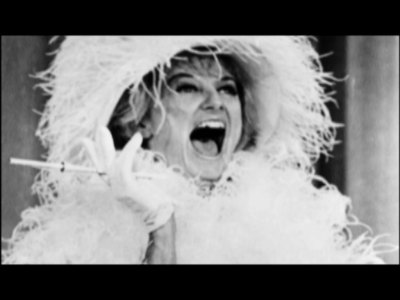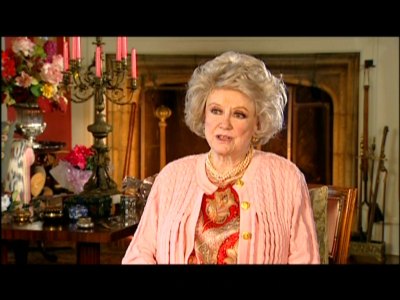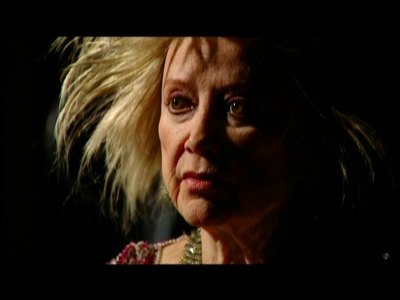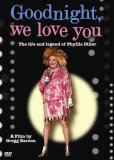| Reviews & Columns |
|
Reviews DVD TV on DVD Blu-ray 4K UHD International DVDs In Theaters Reviews by Studio Video Games Features Collector Series DVDs Easter Egg Database Interviews DVD Talk Radio Feature Articles Columns Anime Talk DVD Savant Horror DVDs The M.O.D. Squad Art House HD Talk Silent DVD
|
DVD Talk Forum |
|
|
| Resources |
|
DVD Price Search Customer Service #'s RCE Info Links |
|
Columns
|
|
|
Goodnight, We Love You - The Life and Legend of Phyllis Diller
If you grew up in the 1960s or 1970s, you couldn't escape comedian Phyllis Diller on the tube. Unmistakable in her garish fright wigs, sequined dresses, short boots, gloves and cigarette holder, Diller was a hilarious apparition from Hell who fired off machine-gun-style zingers at the likes of Johnny Carson, Merv Griffin, Mike Douglas, and Bob Hope on their various television shows and specials. There was a good chance you'd also see her on game shows (What's My Line), variety shows like Carol Burnett's or Sonny and Cher's, or cartoons (Scooby-Doo), as well as in her movies that would show up regularly on TV (Mad Monster Party, The Private Navy of Sgt. O'Farrell). Goodnight, We Love You: The Life and Legend of Phyllis Diller is a solid look at the comedian's life and career, framed by a filmed record of her final stand-up performance.

Born in 1917, in Lima, Ohio to older, stern parents, Phyllis Diller studied to be a concert pianist before making a career at copy writing. She eventually turned to stand-up comedy to help support her six children (her first husband was unable to hold down a job, according to his son in the documentary). Getting her first showbiz exposure as a contestant on Groucho Marx's TV game show, You Bet Your Life, she then went on to her first big break at San Francisco's legendary comedy club, The Purple Onion, in 1955, where she essentially invented the notion of a female stand-up comedian. Further exposure on The Jack Paar Show, as well as gaining a mentor in comedic legend Bob Hope, catapulted her career into the pop culture stratosphere, where she became a household name doing her gags about her poor housekeeping skills, her clueless fictional husband "Fang," and her less-than arresting physical appearance. Capitalizing on her unique look, Diller made her bizarrely-attired appearance a visual hook for her audiences, further setting her apart from her competition, while securing her position as a "must-have" guest on countless TV shows and nightclub venues. Her fame became so great in the late sixties that she was even given two of her own TV series (which unfortunately bombed out with the public). By the 1970s, she was everywhere, traveling all over the world with her stand-up routine, while still popping up on the tube seemingly every week or so.
Goodnight, We Love You: The Life and Legend of Phyllis Diller, much of which consists of Diller herself describing her work and life, is very good at showing the viewer exactly how a star of Diller's stature works, and what her life on the road must be like. I've always wondered how veteran stars like Diller continue working, and what the conditions are like, and this documentary gives a pretty clear view of the process. It's clear that Diller still commands a sizeable fan base (her shows in Vegas regularly sell out), as well as some sizeable perks for her appearances (check out the suite she gets at the hotel). It's also apparent that Diller did something right with all that dough she made over the decades; unlike other showbiz stories that tell of once-popular stars hitting the skids, Diller appears to live an exceeding comfortable life, with a big house, big cars, and a thriving side business that successfully sells her paintings and artwork (which are quite good, by the way). So it's interesting to see the strict paces she puts herself through to continue touring, even at 84 years old (in 2002 when this documentary was filmed). Ever the perfectionist, the documentary's best scene is a sound and light check that Diller does for her final stand-up performances, where the totally professional, even steely Diller shows no signs of letting up on her legendary exacting standards for her show.

This scene nicely amplifies Diller's repeated assertions throughout the film that what looks easy to the audience, is in actuality, quite stressful for the performer. Diller's determination to make her show look as spontaneous and free as possible, masks the incredible attention to detail that she put into her performances, along with the continuous reshaping and reevaluation of her act. The film shows her gag file, which is a huge card catalog filled with thousands of jokes - all of which she wrote herself (a real rarity among comedians; all the biggies, especially guys like Hope and Benny, all had writers).
These glimpses into Diller's art shapes an image of her that I certainly never would have imagined. She's not just funny; she's one tough, smart performer, a total pro battling on long past the time most performers simply give up and give in. Brutally honest right from the start, Diller explains at the beginning of the film that she's retiring from her stand-up act because she just physically can't do it any longer. A close-call with death after a 1999 heart attack necessitated her receiving a pacemaker, but honestly, watching clips of her final performance (which are interspersed throughout the documentary), she comes off as sharp and fit, knocking out jokes at a pretty good clip for someone almost 85 years old. While these health concerns, as well as Diller's advancing age, could have mired the documentary in the familiar, cliched tearjerker territory of similar "end of an era" bios on famous performers, director Barson wisely doesn't sentimentalize Diller or her final performance (an approach that Diller also says is appropriate - she just isn't that way). Instead, we're presented with a comedy legend who knows exactly who she is, is comfortable in her own skin (what a difference from her stage persona), and who has a rich, fulfilling life outside of her stage performing - a life she won't look back at with regret once it's gone. What a difference from most celebrity documentaries.

Where Goodnight, We Love You: The Life and Legend of Phyllis Diller does falter is in the context of showing Diller's earlier career. In a question-and-answer extra included on this disc, the director freely admits that including archival footage of Diller's television and film appearances was too expensive a proposition. However, for many newer viewers who may be unfamiliar with Diller's work, it was absolutely critical to include some context that would illustrate how Diller became so famous. As well, to viewers like myself who fondly remember Diller, seeing some of the old material could only have amplified the documentary's appreciation of Diller's critical importance in the field of comedy. Diller really did start it all for women comics; her ironic, hilarious riffs on the "domestic bliss" of being a housewife and mother, as well as her self-deprecating attacks on her own physical appearance, paved the way for such superstars as Roseanne and Lily Tomlin. What better way to help illustrate her seminal role in the history of female comedians, than to show those early bits? Unfortunately, since the filmmakers made the decision to not include this material, we can only take the film's word for Diller's importance.

The DVDs:
The Video:
Goodnight, We Love You: The Life and Legend of Phyllis Diller has a clear video image, although there was a little artifacting when some of the stills were scanning. As well, some backstage scenes where black predominated, didn't hold together. The aspect ratio is listed at 1.78:1, and looks sharp and focused. Some of the concert footage is a little harsh and garish; it was obviously shot on video -- it's too bad that footage wasn't shot on something a little nicer.
The Audio:
The audio track for Goodnight, We Love You: The Life and Legend of Phyllis Diller is a pointed, strong Dolby Digital 2.0 stereo track -- Diller's signature braying laugh comes through loud and clear.
The Extras:
Extras for Goodnight, We Love You: The Life and Legend of Phyllis Diller include the full, unedited 43 minute farewell stand-up performance concert that Diller gave (snippets of which appear in the full documentary). Be warned: this is rather blue material, so if you're easily offended, don't watch this non-P.C. performance. However, if you want to laugh yourself sick, by all means cue it up after the documentary. Diller is a total pro, and she gets laughs effortlessly (or at least that's how she wants you to see it). And as Diller says in the film; if it gets a laugh, that's all that counts. There's the aforementioned Q & A with Diller and director Barson after the premier of the film -- it's fairly unintelligible (you can barely hear the questions asked), but it's interesting to see Diller off the stage, handling an audience. There's also a "Dustbiter" bonus (Diller's name for all of the traveling secretaries she's had -- over 35 of them!), where Phyllis talks with Heidi Rotbart about some of their adventures together. A trailer for the film is also included.
Final Thoughts:
I was a fan of Diller's comedy before I watched Goodnight, We Love You: The Life and Legend of Phyllis Diller. I grew up watching her on TV, and she was always good for a solid, funny act -- I never saw her bomb out with an audience. But after watching Goodnight, We Love You: The Life and Legend of Phyllis Diller, I really became a fan of Diller herself. She's a tough, sharp professional who also goes out of her way to be kind to her fans, while ensuring that every performance she puts on is executed with the utmost precision and craft. For all those years, she really did make it seem like she was just walking out on stage to tell some funny jokes. Goodnight, We Love You: The Life and Legend of Phyllis Diller shows how deliberately false that image was -- which is just what Diller wanted all along. I recommend Goodnight, We Love You: The Life and Legend of Phyllis Diller.
Paul Mavis is an internationally published film and television historian, a member of the Online Film Critics Society, and the author of The Espionage Filmography.


|
| Popular Reviews |
| Sponsored Links |
|
|
| Sponsored Links |
|
|
| Release List | Reviews | Shop | Newsletter | Forum | DVD Giveaways | Blu-Ray | Advertise |
|
Copyright 2024 DVDTalk.com All Rights Reserved. Legal Info, Privacy Policy, Terms of Use,
Manage Preferences,
Your Privacy Choices | |||||||












